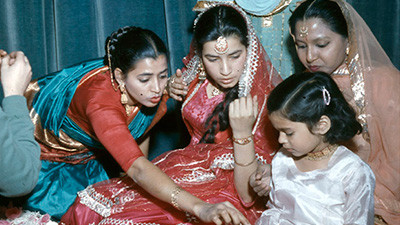Delving into your family history is a fascinating journey that connects you to your past, revealing rich stories and experiences of your ancestors. Whether you’re just beginning or are an experienced genealogist, numerous resources are available to aid your Family History Search. These resources, including census data, immigration documents, naturalization records, and military archives, offer invaluable insights into the lives of those who came before you. Let’s explore how you can effectively start your family history search and uncover your heritage.
 A person looking at old documents, representing how to begin genealogy research
A person looking at old documents, representing how to begin genealogy research
Beginning your family history search involves understanding the types of records that can unlock your past. Each record type provides unique details about your ancestors’ lives, locations, and significant events. Starting with readily available resources and systematically exploring different record categories is key to a successful family history search.
Essential Records for Your Family History Search
To conduct a thorough family history search, familiarizing yourself with key record types is crucial. Each category holds specific information that can piece together your ancestral puzzle.
Census Records: A Snapshot in Time
Census records are a cornerstone of family history search, offering periodic snapshots of populations. These records typically list individuals within a household, including names, ages, birthplaces, occupations, and family relationships at the time of the census. Census data can help track your ancestors across different years, revealing family growth, migration patterns, and economic status.
 Close-up of a census record, symbolizing census records for family history search
Close-up of a census record, symbolizing census records for family history search
Searching census records involves knowing the census years available for your region of interest and understanding how records are indexed and accessed. Many archives and online genealogy platforms provide digitized census records with search capabilities, making your family history search more efficient.
Birth, Marriage, and Death Records: Vital Statistics
Birth, marriage, and death records, often called vital statistics, are fundamental for tracing family lineages. Birth records provide names, dates and places of birth, parent’s names, and sometimes occupations. Marriage records typically include names of the bride and groom, marriage date and place, and often parents’ names and residences. Death records offer details such as the deceased’s name, date and place of death, cause of death, and sometimes burial information and family details.
 Old birth, marriage, and death certificates, representing vital records in family history search
Old birth, marriage, and death certificates, representing vital records in family history search
Accessing these records varies by location and time period. Many jurisdictions have digitized vital records, available through online databases or archives. These records are essential for confirming key life events and extending your family tree.
Immigration Records: Tracing Ancestral Journeys
For families with immigrant ancestors, immigration records are invaluable for your family history search. These records document the arrival of individuals into a country and can include passenger lists, border crossing records, and naturalization documents. Passenger lists often contain names, ages, origins, destinations, and sometimes occupations of immigrants.
 A ship at sea, representing immigration records for family history search
A ship at sea, representing immigration records for family history search
Immigration records can pinpoint when and how your ancestors arrived in a new country, their places of origin, and potentially traveling companions. Searching immigration records helps trace ancestral journeys and understand migration patterns.
Military Records: Service and Sacrifice
Military records are a rich source for family history search, particularly if your ancestors served in the armed forces. These records can include enlistment papers, service records, pension files, and sometimes even medical histories. Military records often detail service locations, ranks, units, battles, and significant events in a soldier’s military career.
 Soldiers in uniform, representing military history records for family history search
Soldiers in uniform, representing military history records for family history search
Exploring military records can reveal periods of service, conflicts involved in, and even details about an ancestor’s character and experiences. These records provide a personal connection to historical events and can highlight family contributions to military history.
Citizenship and Naturalization Records: Becoming a Citizen
Citizenship and naturalization records document the process by which foreign-born individuals become citizens of a new country. These records often include applications for citizenship, declarations of intent, and certificates of naturalization. They can provide details about an immigrant’s origins, previous nationalities, residences, and dates of becoming a citizen.
For family history search, naturalization records can bridge gaps between immigration and later life events. They offer clues about when an ancestor settled permanently in a new country and formally became a citizen.
Exploring Ethno-Cultural Roots: Diverse Heritages
Family history search can also delve into ethno-cultural roots, exploring the diverse backgrounds of ancestors. Records related to specific ethnic or cultural groups can provide unique insights. These might include community histories, cultural organization records, religious documents, and specialized genealogical resources focused on particular groups.
 Diverse group of people, representing ethno-cultural roots in family history search
Diverse group of people, representing ethno-cultural roots in family history search
Researching ethno-cultural roots enriches your family history search by adding cultural context and understanding the traditions and communities that shaped your ancestors’ lives.
Employment and Land Records: Life and Livelihood
Employment and land records offer a different dimension to family history search, detailing how ancestors earned a living and their connections to property. Employment records might include professional licenses, employment registers, and records from specific industries or companies. Land records encompass property deeds, land grants, tax assessments, and maps.
 Old employment documents, representing employment records for family history search
Old employment documents, representing employment records for family history search
 Antique land deed, representing land records for family history search
Antique land deed, representing land records for family history search
These records can reveal occupations, economic status, and geographic mobility. Land records, in particular, can establish where ancestors lived and their community ties.
Research Guides and Resources for Your Family History Search
To assist your family history search, numerous research guides and resources are available. These guides often provide step-by-step instructions, lists of record sources, and tips for effective genealogical research. Online databases, archival websites, and genealogical societies are invaluable resources for accessing records and connecting with other researchers.
[The original article’s table of research guides and resources would be beneficial to keep and link to for users.]
Embarking on a family history search is a rewarding endeavor. By utilizing the diverse records available and employing effective research strategies, you can uncover the stories of your ancestors and build a deeper understanding of your family heritage. Start your family history search today and connect with your past!

 A citizenship certificate, representing citizenship and naturalization records for family history search
A citizenship certificate, representing citizenship and naturalization records for family history search 